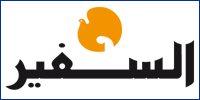As-Safir
 | |
| Type | Daily newspaper |
|---|---|
| Format | Broadsheet |
| Publisher | Dar Al Safir |
| Editor | Talal Salman |
| Founded | 26 March 1974 |
| Political alignment | Pan-Arab Pro-Assad[1][2] |
| Language | Arabic |
| Headquarters | Beirut, Lebanon |
| Circulation | 50,000 (2012) |
| Website | Official website |

As-Safir (Template:Lang-ar), meaning The Ambassador, is a leading Arabic-language daily newspaper in Lebanon. The headquarters of the daily is in Beirut.[3]
History and profile
As-Safir was first published by Talal Salman on 26 March 1974 as an Arabic political daily.[4][5] Talal Salman also served as chief editor of the paper.[6] In 2005, the daily's chief editor was late Joseph Samaha.[7][8] The current publisher of the daily is Dar Al Safir.[3] It is published in broadsheet format.[9]
On 18 July 2011, the paper, together with Al Akhbar, another daily published in Lebanon, was banned in Syria.[10]
As-Safir has a weekly page on the environmental issues.[11]
Political approach
As-Safir states its mission as to be "the newspaper of the Arab world in Lebanon, and the newspaper of Lebanon in the Arab world."[12] This remains the slogan printed on the paper's masthead.[5] The paper provided an independent voice for the left-wing, Pan Arab tendency which was increasingly active in Lebanese intellectual and political life in the years after the Arab defeat in the Six-Day War. It also focuses on Muslim interests, advocating Arab nationalism, and is close to Hezbollah and has a pro-Syrian stance.[13]
Another Lebanese daily, An-Nahar, is cited as the rival of As-Safir.[14] In the mid-1990s, the paper was described as a left-of-center paper, whereas An-Nahar as a right-of-center paper.[15] During the same period, As-Safir was also described by Robert Fisk as a Syrian-backed newspaper.[16] In the 2000s these papers were again supporters of two opposite poles in Lebanon, in that An-Nahar is a supporter of March 14 alliance, whereas As-Safir supported March 8 alliance.[17]
After the assassination of Rafik Hariri on 14 February 2005, Talal Salman wrote "Some want to use his death as a catalyst to create sectarian strife to complete the schemes of the Israeli occupation in Palestine and the American occupation of Iraq."[18]
Circulation and websites
As-Safir had the second highest circulation in the 1990s after An-Nahar.[15] Its circulation was 45,000 copies in 2003, being the second best selling paper in Lebanon.[9] In 2012, the Lebanese Ministry of Information stated that the daily had a circulation of 50,000 copies, being the first in the country.[4][17][19]
In addition to its Arabic website, the paper has also an English website. The paper's online version was the 16th most visited website for 2010 in the MENA region.[20]
References
- ^ Cumming-Bruce, Nick (18 February 2013). "U.N. Rights Officials Urge Syria War Crimes Charges". The New York Times. Retrieved 26 April 2015.
the pro-Assad Lebanese newspaper As-Safir
- ^ Badran, Tony (25 April 2013). "Assad reading the signs". NOW News. Retrieved 27 April 2015.
The Pro-Assad regime Lebanese newspaper As-Safir
- ^ a b "Media Landscape". Menassat. Retrieved 22 September 2013.
- ^ a b "Lebanon. Media Landscape". European Journalism Center. Retrieved 15 September 2014.
- ^ a b "Lebanon" (PDF). Publicitas. Retrieved 8 June 2012.
- ^ Yehia, Ranwa (27 January – 2 February 2000). "Salam bid farewell". Al Ahram Weekly. 466. Retrieved 27 March 2013.
- ^ Mouawad, Jad (9 March 2005). "Lebanese Lawmakers Bring Back Pro-Syrian Prime Minister". The New York Times. Retrieved 18 March 2013.
- ^ Assir, Serene (21–27 April 2005). "Divided we fall". Al Ahram Weekly. 739. Retrieved 15 April 2013.
- ^ a b "World Press Trends" (PDF). Paris: World Association of Newspapers. 2004. Retrieved 15 February 2015.
- ^ "Press and Cultural Freedom in Lebanon, Syria, Jordan and Palestine" (Annual report). SKeyes. 2011. Retrieved 10 October 2014.
- ^ Najib Saab. "The Environment in Arab Media" (Report). Arab Forum for Environment and Development. Retrieved 7 October 2014.
- ^ Dany Badran (2013). "Democracy and Rhetoric in the Arab World". The Journal of the Middle East and Africa. 4 (1): 65–86. doi:10.1080/21520844.2013.772685. Retrieved 13 October 2013.
- ^ "Mikati unveils 30-member Cabinet dominated by Hizbullah and March 8 allies". The Daily Middle East Reporter. 14 June 2011. Retrieved 10 March 2013.
- ^ Fakih, Mohalhel (2–8 September 2004). "Pulling at Lebanon's strings". Al Ahram Weekly. 706. Retrieved 19 April 2013.
- ^ a b Yahya R. Kamalipour; Hamid Mowlana (1994). Mass Media in the Middle East: A Comprehensive Handbook. Westport, CT: Greenwood Press. Retrieved 9 September 2013. – via Questia (subscription required)
- ^ Robert Fisk (13 May 1993). "Beirut newspaper defies closure: Lebanese officials say left-wing daily 'endangered security of the state' with peace talks report". The Independent. Beirut. Retrieved 31 July 2014.
- ^ a b "Mapping Digital Media: Lebanon" (PDF). Open Society Foundations. 15 March 2012. Retrieved 19 September 2013.
- ^ Abdel Latif, Omayma (3–9 March 2005). "What next, Lebanon?". Al Ahram Weekly. 732. Retrieved 15 April 2013.
- ^ "Lebanon Press". Press Reference. Retrieved 27 September 2013.
- ^ "Forbes Releases Top 50 MENA Online Newspapers; Lebanon Fails to Make Top 10". Jad Aoun. 28 October 2010. Retrieved 11 September 2014.
